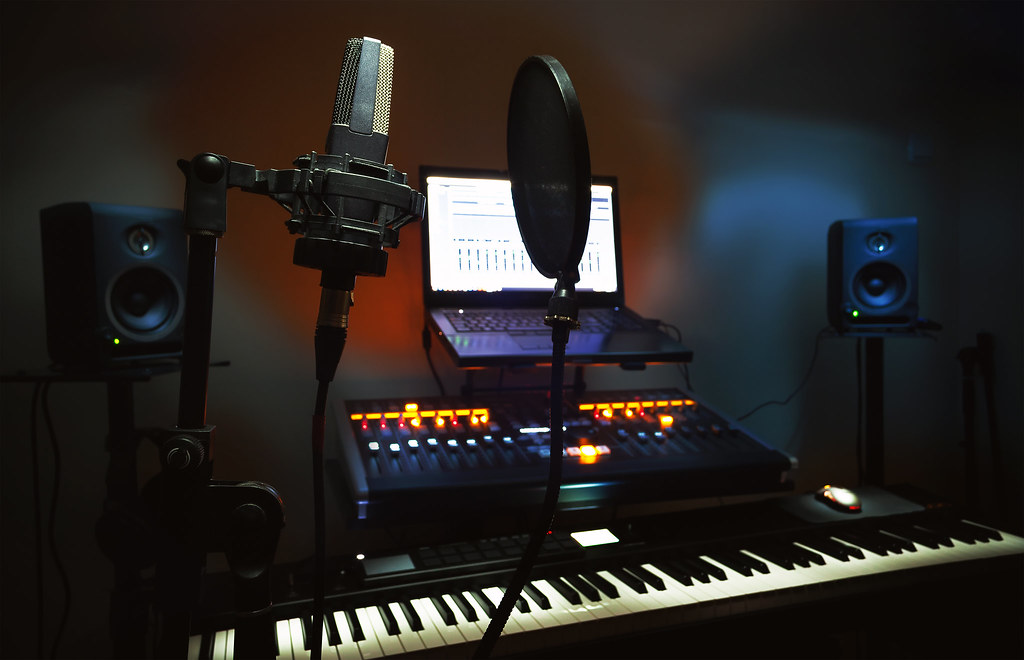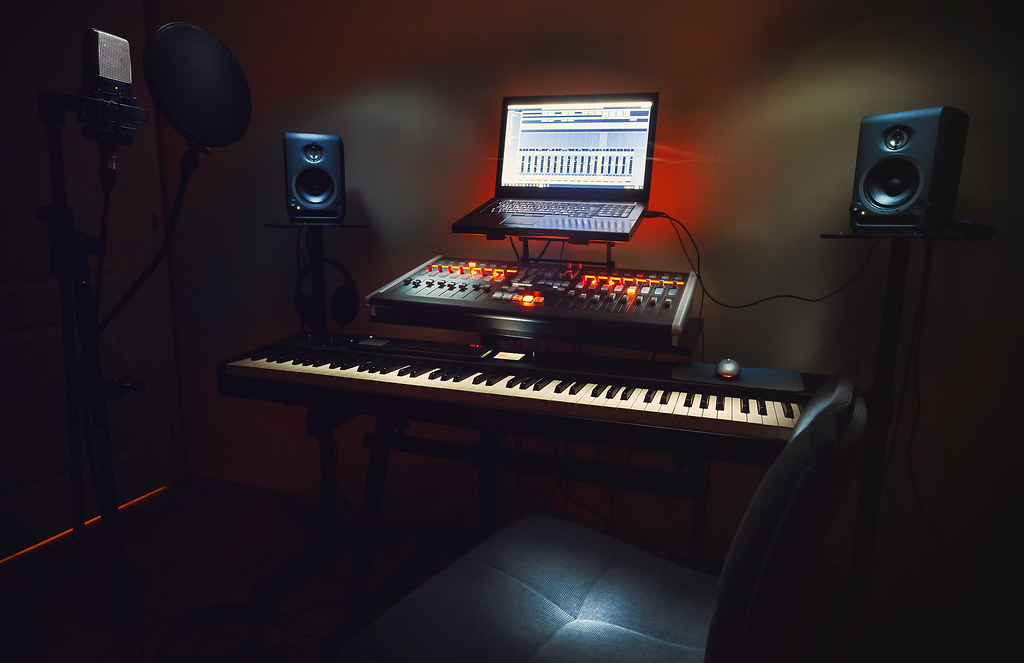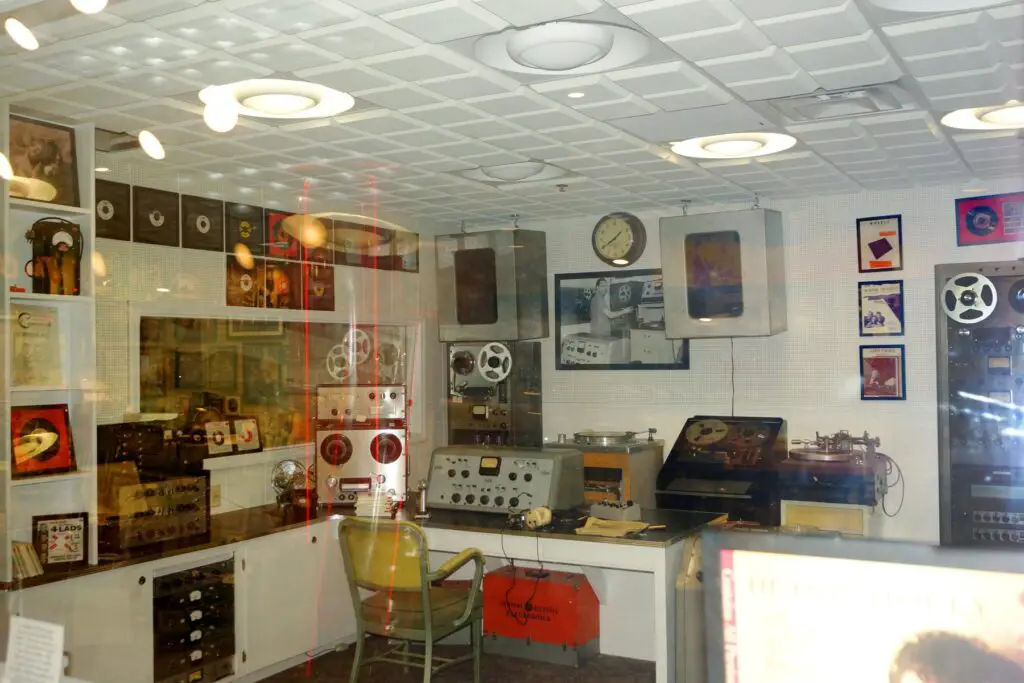Are you looking to take your music production to the next level? Look no further than music production plugins. These essential tools can significantly enhance the quality of your home recordings, allowing you to create professional-level tracks from the comfort of your own studio. In this article, we’ll explore the top 10 music production plugins that every home recording studio should have. Whether you’re a beginner or a seasoned pro, these plugins will help you achieve the sound you’re looking for.
Table of Contents

Understanding Music Production Plugins
Music production plugins are powerful software components that can be added to your DAW to extend its functionality. With plugins, you can create new sounds, add effects to your tracks, and improve your overall recording quality. Before we dive into the top 10 music production plugins, let’s explore what they are and how they work.
What are Music Production Plugins?
Music production plugins are add-ons for your digital audio workstation (DAW). These plugins process audio data in real-time as it passes through your DAW. There are three main types of plugins: effects, instruments, and utilities.
Types of Music Production Plugins
Effects Plugins
Effects plugins are used to add processing to your tracks. They can be used to add reverb, delay, compression, distortion, and more. Effects plugins can be applied to individual tracks or the entire mix.
Instruments Plugins
Instrument plugins are used to create new sounds and instruments. They can simulate traditional instruments like pianos, guitars, and drums, or create entirely new sounds. Instrument plugins can be used to create melodies, basslines, and drum patterns.
Utility Plugins
Utility plugins are used to improve your workflow and the overall quality of your recording. They can adjust volume levels, remove noise, and enhance audio clarity. Utility plugins can also be used to analyze audio data, manage routing, and automate tasks.
By adding music production plugins to your DAW, you can expand its capabilities and create professional-sounding recordings in the comfort of your own home. In the next section, we will explore a list of essential plugins that every home recording studio should have.

Essential Plugins for Music Production
Plugins are essential tools for every home recording studio. They can help to improve the overall quality of your recordings and make your music sound more polished and professional. Here are some of the essential plugins that every home recording studio should have.
1. EQ Plugins
EQ plugins are used to adjust the frequency levels of your tracks. They can be used to boost or cut specific frequencies, which can help to balance your mix and improve the clarity of your recordings. A popular EQ plugin is the FabFilter Pro-Q 3. It offers a user-friendly interface and advanced features such as dynamic EQ, mid-side processing, and per-band soloing.
2. Compression Plugins
Compression plugins are used to control the dynamic range of your tracks. They can bring up the volume of quiet parts of your track and reduce the volume of loud parts. Compression plugins can improve the overall balance of your mix and make your recordings sound more polished. A popular compression plugin is the Waves SSL G-Master Buss Compressor. It is modeled after the classic SSL G-Master Buss Compressor and offers a warm, analog-style sound.
3. Reverb Plugins
Reverb plugins are used to add space and depth to your tracks. They can simulate different types of spaces, from small rooms to large concert halls. Reverb plugins can create a more immersive listening experience and make your recordings sound more professional. A popular reverb plugin is the ValhallaRoom. It offers a wide range of reverb styles and a user-friendly interface.
4. Delay Plugins
Delay plugins are used to create echoes and repeating patterns in your tracks. They can add depth and interest to your recordings. Delay plugins can create subtle echoes or wild, rhythmic patterns. A popular delay plugin is the Soundtoys EchoBoy. It offers a wide range of delay styles, from classic tape echoes to modern digital delays.
5. Saturation Plugins
Saturation plugins are used to add warmth and character to your tracks. They can simulate the sound of analog equipment like tape machines and tube amplifiers. Saturation plugins can make your recordings sound more lively and dynamic. A popular saturation plugin is the Slate Digital Virtual Tape Machines. It offers a range of tape machine emulations and a user-friendly interface.
6. Synth Plugins
Synth plugins are used to create new sounds and instruments. They can create melodies, basslines, and drum patterns. Synth plugins can create traditional instruments like pianos and guitars or entirely new sounds. A popular synth plugin is the Native Instruments Massive X. It offers a wide range of sounds and a user-friendly interface.
7. Drum Plugins
Drum plugins are used to create drum sounds and patterns. They can create realistic drum sounds or new, experimental drum patterns. Drum plugins can add rhythm and energy to your recordings. A popular drum plugin is the XLN Audio Addictive Drums 2. It offers a wide range of drum sounds and a user-friendly interface.
8. Vocal Plugins
Vocal plugins are used to process vocal recordings. They can adjust the pitch, add effects, and improve the overall sound quality of your vocal recordings. Vocal plugins can make your recordings sound more polished and professional. A popular vocal plugin is the Antares Auto-Tune Pro. It offers advanced pitch-correction features and a user-friendly interface.
9. Noise Reduction Plugins
Noise reduction plugins are used to remove unwanted noise from your recordings. They can remove background noise, hiss, and hum. Noise reduction plugins can improve the overall quality of your recordings. A popular noise reduction plugin is the iZotope RX 7. It offers advanced noise reduction features and a user-friendly interface.
10. Limiter Plugins
Limiter plugins are used to prevent your tracks from clipping and distorting. They can ensure that your recordings sound clean and polished. Limiter plugins can improve the overall volume and loudness of your recordings. A popular limiter plugin is the Waves L2 Ultramaximizer. It offers advanced limiting features and a user-friendly interface.

Best Music Production Plugins
In this section, we will take a look at some of the best music production plugins available for home recording studios. These plugins are popular among producers and engineers, and can help improve the quality of your music production.
1. FabFilter Pro-Q 3
The FabFilter Pro-Q 3 is a powerful EQ plugin that offers advanced features such as dynamic EQ, mid-side processing, and per-band soloing. This plugin is popular among producers and engineers for its user-friendly interface and high-quality sound. With its advanced features, you can fine-tune your mix and get the best out of your recordings.
2. Waves SSL G-Master Buss Compressor
The Waves SSL G-Master Buss Compressor is a classic compressor plugin that is modeled after the SSL G-Master Buss Compressor. This plugin offers a warm, analog-style sound and is popular among producers and engineers for its versatility and ease of use. With its ability to add warmth and character to your recordings, this plugin is a must-have for any home recording studio.
3. ValhallaRoom
ValhallaRoom is a popular reverb plugin that offers a wide range of reverb styles and a user-friendly interface. This plugin is known for its high-quality sound and affordability. With its wide range of reverb styles, you can create the perfect atmosphere for your recordings.
4. Soundtoys EchoBoy
The Soundtoys EchoBoy is a popular delay plugin that offers a wide range of delay styles, from classic tape echoes to modern digital delays. This plugin is known for its versatility and high-quality sound. With its ability to add depth and dimension to your recordings, this plugin is a favorite among producers and engineers.
5. Slate Digital Virtual Tape Machines
The Slate Digital Virtual Tape Machines is a popular saturation plugin that offers a range of tape machine emulations and a user-friendly interface. This plugin is known for its ability to add warmth and character to recordings. With its tape machine emulations, you can get the same warmth and character of analog tape recordings in your digital recordings.
6. Native Instruments Massive X
The Native Instruments Massive X is a popular synth plugin that offers a wide range of sounds and a user-friendly interface. This plugin is known for its versatility and high-quality sound. With its wide range of sounds, you can create unique and interesting sounds for your recordings.
7. XLN Audio Addictive Drums 2
The XLN Audio Addictive Drums 2 is a popular drum plugin that offers a wide range of drum sounds and a user-friendly interface. This plugin is known for its realism and versatility. With its realistic drum sounds, you can create authentic drum tracks for your recordings.
8. Antares Auto-Tune Pro
The Antares Auto-Tune Pro is a popular vocal plugin that offers advanced pitch-correction features and a user-friendly interface. This plugin is known for its ability to improve the overall sound quality of vocal recordings. With its advanced pitch-correction features, you can achieve a polished and professional sound for your vocal recordings.
9. iZotope RX 7
The iZotope RX 7 is a popular noise reduction plugin that offers advanced noise reduction features and a user-friendly interface. This plugin is known for its ability to remove unwanted noise from recordings. With its advanced noise reduction features, you can clean up your recordings and get rid of unwanted noise.
10. Waves L2 Ultramaximizer
The Waves L2 Ultramaximizer is a popular limiter plugin that offers advanced limiting features and a user-friendly interface. This plugin is known for its ability to prevent recordings from clipping and distorting. With its advanced limiting features, you can ensure that your recordings are always clean and distortion-free.
Tips for Using Music Production Plugins Effectively
To help you make the most out of music production plugins, we’ve compiled some insider tips to ensure you produce the best possible sound:
Experiment with different plugins and settings
One of the best things about music production plugins is their versatility. With a vast array of options available, don’t be afraid to experiment with different plugins and settings. Try adjusting the parameters and see how they affect the sound of your recording. This can help you discover unique sounds that can set your music apart from others.
Use plugins in moderation
Plugins can be incredibly useful in enhancing the quality of music production, but it’s important not to overuse them. Using too many plugins can clutter your mix and create a muddy sound. Make sure to use plugins in moderation and only when necessary. Use them to address specific issues or to achieve a particular sound.
Trust your ears
When it comes to music production, your ears are your most important tool. While visual cues and preset settings can be helpful, always trust your ears to guide you to the perfect sound for your recording. Take the time to listen carefully to your mix and make adjustments according to what you hear. This will help you achieve the best possible sound for your music production.
By following these tips, you can make the most out of music production plugins and create high-quality recordings that stand out from the rest.

Future Developments in Music Production Plugins
The world of music production plugins is constantly evolving, with new plugins and features being released all the time. However, some of the most exciting developments in music production plugins are yet to come. Here are some of the future developments that are expected to shape the music production industry:
Machine Learning and AI
Many plugin developers are exploring the use of machine learning and artificial intelligence to create more advanced and sophisticated plugins. These intelligent plugins can learn from user behavior and adapt to their preferences, making the music production process more efficient and personalized. They can also provide more accurate and effective suggestions for plugin settings and configurations based on the user’s unique needs.
Cloud-Based Plugins
Some developers are exploring the use of cloud-based plugins, which can be accessed from anywhere and offer increased flexibility and collaboration options. With cloud-based plugins, music producers can easily collaborate with other musicians and producers from all over the world, regardless of their location. This can lead to increased creativity and innovation in the music production process.
Virtual Reality Plugins
A few developers are experimenting with virtual reality plugins, which allow producers and musicians to immerse themselves in a virtual studio environment, complete with virtual instruments and equipment. With virtual reality plugins, producers can create music in a more immersive and realistic environment, leading to more creative and innovative music production.
While these developments are still in their early stages, they hold a lot of promise for the future of music production. As technology continues to advance, we can expect to see even more exciting developments in the world of music production plugins.

Comparison of Free vs. Paid Plugins
Music production plugins can either be free or paid. Here are some pros and cons of using free vs. paid plugins:
Free Plugins
Free plugins can be a great option for beginners or those on a tight budget. However, they have some limitations that might affect the overall quality of music production. Here are some of their pros and cons:
Pros
- No cost: Free plugins don’t require any payment, making them accessible to everyone.
- Accessible to everyone: Free plugins can be downloaded and installed by anyone.
- Good for beginners: Free plugins can be a great way to learn about music production and experiment with different sounds.
Cons
- Limited features: Free plugins might be limited in terms of features and customization options.
- May not be as high quality: Free plugins might not provide the same quality of sound as paid plugins.
- May not be as reliable: Free plugins might not be as reliable as paid plugins, and might cause crashes or glitches in the digital audio workstation (DAW) software.
Paid Plugins
Paid plugins generally offer more features and higher quality sound than free plugins. However, they come with a higher price tag and might require additional software or hardware. Here are some of their pros and cons:
Pros
- Generally higher quality: Paid plugins usually provide higher quality sound than free plugins.
- More features and customization options: Paid plugins usually offer more features and customization options than free plugins.
- Better customer support: Paid plugins usually come with better customer support than free plugins.
Cons
- Expensive: Paid plugins can be expensive, especially for those on a tight budget.
- May require additional software or hardware: Paid plugins might require additional software or hardware to work properly.
- Not accessible to everyone: Paid plugins are not accessible to everyone, as they require a payment to be made.
It’s important to weigh the pros and cons of free and paid plugins carefully before making a decision. Consider your budget, skill level, and specific needs when choosing music production plugins.
Conclusion
In conclusion, music production plugins are an indispensable asset for any home recording studio. They enable you to enhance the quality of your recordings and give your music a professional touch. By selecting the appropriate plugins for your needs and understanding the different types available, you can create high-quality recordings that sound polished and professional. Whether you choose to use free or paid plugins, it is essential to use them in moderation and always trust your ears.
Remember to keep your music production plugins up-to-date and experiment with different plugins to find your perfect match. Also, don’t forget to check out our other articles on home recording studio equipment and music production software to stay up-to-date with the latest trends and techniques.
Join the community of music enthusiasts and take your music production to the next level with the right tools and techniques.
Questions & Answers
Q. Who can benefit from using music production plugins?
A. Anyone in the music industry, from beginners to seasoned pros.
Q. What are some common types of music production plugins?
A. EQ, compression, reverb, delay, saturation, and synth plugins.
Q. How do music production plugins work with a digital audio workstation (DAW)?
A. Plugins process audio data in real-time as it passes through the DAW.
Q. What if I don’t have a lot of money to spend on plugins?
A. There are many free plugins available, but paid ones generally offer more features and higher quality sound.
Q. How can I choose the right plugins for my needs?
A. Consider your budget, skill level, and specific needs when choosing plugins.
Q. What if I’m not sure how to use plugins effectively?
A. Experiment with different plugins and settings, use them in moderation, and trust your ears to guide you to the best sound.


